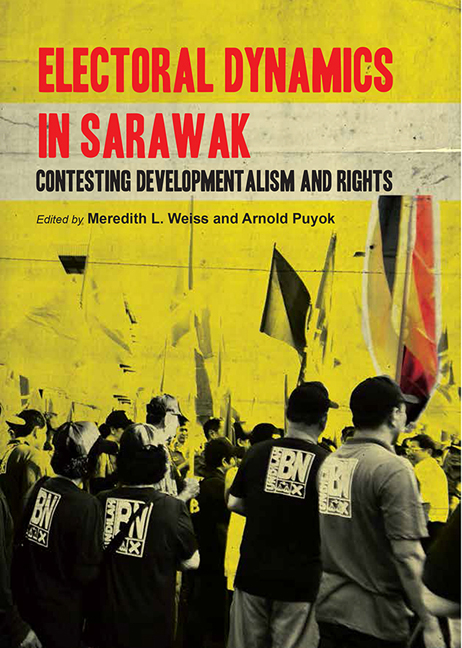Book contents
- Frontmatter
- Contents
- Acknowledgements
- Glossary & Acronyms
- About the Contributors
- Chapter 1 The 2016 Sarawak State Elections: Old Stories and New Punch Lines
- Chapter 2 Tupong: If It Ain‘t Broke, Don't Fix It!
- Chapter 3 Stakan: Much Ado About Postal Votes?
- Chapter 4 Repok and Meradong: Challenges in Courting Rural Votes
- Chapter 5 Ba’ Kelalan: Sustaining the Crack in the BN's Rural Dominance
Chapter 4 - Repok and Meradong: Challenges in Courting Rural Votes
Published online by Cambridge University Press: 12 February 2019
- Frontmatter
- Contents
- Acknowledgements
- Glossary & Acronyms
- About the Contributors
- Chapter 1 The 2016 Sarawak State Elections: Old Stories and New Punch Lines
- Chapter 2 Tupong: If It Ain‘t Broke, Don't Fix It!
- Chapter 3 Stakan: Much Ado About Postal Votes?
- Chapter 4 Repok and Meradong: Challenges in Courting Rural Votes
- Chapter 5 Ba’ Kelalan: Sustaining the Crack in the BN's Rural Dominance
Summary
The losses of the Democratic Action Party (DAP) in five Chinesemajority seats in the 11th Sarawak state election shocked political observers who had been convinced the party had solid support in most Chinese-majority seats. These five seats share interesting characteristics – their ethnic composition, semi-urban character, agriculture-based economy, and political history as Barisan Nasional (National Front, BN) or SUPP (Sarawak United People's Party) strongholds for decades until recently. The instability of DAP electoral performance in those seats, in contrast to its persistent victory in urban Chinese-majority areas, gives some indication that degree of urbanisation or local context may take precedence over factors such as ethnicity and national politics when it comes to voting. This study uses a comparative examination of contests in two of those seats, Repok and Meradong, to explore an explanation for the BN's victory, whether there might be a distinctive ‘rural Chinese’ voting pattern, and how political developments deviated from those of previous elections. Comparison of these two areas, selected for their highly similar socio-economic characteristics, intends to measure the effects on voting of factors other than the choice of candidates.
The chapter is structured in four sections. The first section gives a general description of each candidate and constituency, then the second part provides in-depth, descriptive accounts of the campaign issues raised and strategies used by both parties. The third explores the social and political implications of the campaigns and polling results. The last section offers concluding remarks.
Political profiles of Repok and Meradong
The total population of Sarikei District is 56,228 (as of 2010), of which ethnic Chinese comprise about 40 per cent, followed by 33 per cent Iban, 16 per cent Malay, and 7 per cent Melanau. The economy of Sarikei is primarily agricultural. A sizeable proportion of Chinese in Sarikei are involved in farming and farming-related business. The local authority of Sarikei has yet to meet the criteria of a municipal council, which include covering an area with a population of over 150,000 and having an annual revenue of more than RM20 million. There are two state constituencies, Repok and Meradong, under the parliamentary seat of Sarikei. Both Repok and Meradong are Chinese-majority seats.
- Type
- Chapter
- Information
- Electoral Dynamics in SarawakContestin Developmentalism and Rights, pp. 69 - 98Publisher: ISEAS–Yusof Ishak InstitutePrint publication year: 2017



